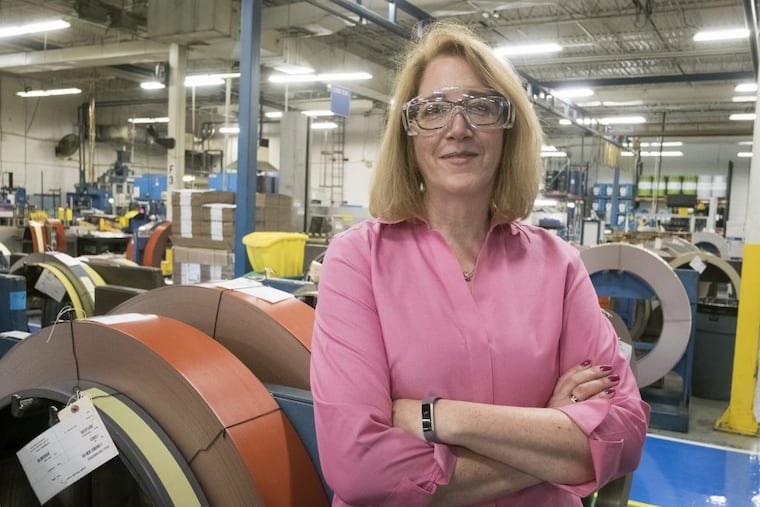How meditation helps Susan Sweeney lead her company
At 1,200-employee global manufacturing company that she runs from a factory in Thorofare, managers rely on an unusual management tool: Meditation.

Sometimes customers just need a little convincing to close the sale, and Susan Sweeney, 54, president of GGB Bearing Technology remembered one time that she needed to step in to persuade a potential client to order her company's self-lubricating bearings.
"I had a customer about six months ago who said, 'You say you don't need maintenance on your bearings. How do I know that's true?'
"I thought about it and said, 'Well, we have parts on the Mars Rover and we don't go up there and do maintenance on them and they haven't replaced them.' Point taken, he said."
GGB Bearings, eight factories worldwide, is a straight-up manufacturing company: assembly lines, forklifts, safety glasses, the whole bit. But the culture is more new-age, closer to group therapy. This is a company whose CEO sits down with factory workers in a book group, and where meetings — even conference calls — begin with meditation, referred to in company-speak as "centering," where participants focus on breathing and clearing the mind of chatter.
GGB, with 1,200 employees, 280 in Thorofare, belongs to a 5,000-employee conglomerate. These practices are used globally, from China, to France, to South America.
"I've actually done the process with the chairman of our union," Sweeney said, "just to get him used to the idea."
Tell me how you use it.
Before we have a meeting, especially something that might be a little more difficult or if we have to work through a contentious problem, we'll do what's called centering. Sometimes it's guided meditation. We have lots of different apps that we use. Sometimes someone will step in and they actually speak for five minutes, and kind of walk you through a particular process. Or sometimes people will just want to meditate in silence. Sometimes the guys from China have this beautiful music that they'll play for five minutes.
People on the phone are doing it?
We do it on the phone. That took a little bit for us to get through, but we'll have a centering on the phone with people from all over the world.
What has that done for your meeting?
Well, it's wonderful. I used to center or deep breathe after I'd get upset. I'd go take a walk or try to calm down. That's reactionary. If you do it beforehand and you clear your mind of all those things that are circling — I call it the gerbil wheel that goes around in your head — then you're more present and you're better at listening. I think it also gets the group at a place where we can talk about whatever is on our mind. We also do what's called a "check-in," where people will talk about how they're feeling. So, I shared this morning about my parent having a health issue.
Has it ever happened that the meeting has gotten emotional and someone has requested a break for centering?
Absolutely. Actually, often I'll ask for it. I'll say "Hey, I need to center here." I can find I've been triggered. That's the word we use, because we all have things that trigger us emotionally. When you go into that space, your brain starts to get into its very primal self-defense. You're not thinking your best, and we recognize that.
What else do you do?
We have a union contract and [grievance] process we go through, but we have this other process called "Resolving Differences." If someone has a conflict or a problem with a person and they're not able to resolve it, they can ask for a mediator to come in and where you sit down and talk about the issue. Liz [her assistant] is actually one of our most requested mentors. She just helps people work through if there's a problem.
It could be a manager and a worker, union or non-union?
It could be anybody. You can just ask for help.
Does all this personal sharing make people feel uncomfortable?
Vulnerability is a big deal. You can't go into this space unless you are willing to be vulnerable. I didn't succeed in [automotive] manufacturing in Detroit as a female without building up some pretty solid walls — brick walls that were reinforced around me. I didn't talk about personal stuff at all. So, I had to knock those walls down a little bit. I've learned it is important for me to talk about my stories and what I've learned, and to help people understand what I'm thinking.
Interview questions and answers have been edited for space.
SUSAN SWEENEY:
Home: Greenville, Del.
Family: Husband, Patrick; children, Taylor and Andrew.
Diplomas: Kalamazoo College, economics; University of Detroit Mercy, master's in business administration; Wilmington University, doctorate in organizational leadership.
Book recommendation: The Color Master by Aimee Bender — because of insight into mentoring, leadership and confidence.
GGB BEARING TECHNOLOGY:
Where: Headquarters, two factories in Thorofare; part of eight factories worldwide, in China, Europe, South America. Employs 1,200, 280 locally.
What: Maker of bearings, bearing casings; founded in London in 1899.
Point of pride: Makes bearings used on the Mars Rover.
Ownership: A division of EnPro Industries Inc., Charlotte, N.C., a 5,000-employee industrial conglomerate with a company-wide 2016 loss of $40.1 million on sales of $1.19 billion.